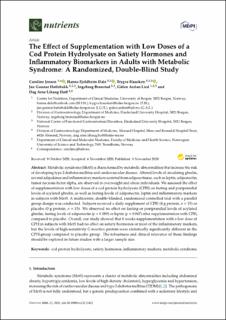The effect of supplementation with low doses of a cod protein hydrolysate on satiety hormones and inflammatory biomarkers in adults with metabolic syndrome: A randomized, double-blind study
Jensen, Caroline; Dale, Hanna Fjeldheim; Hausken, Trygve; Hatlebakk, Jan Gunnar; Brønstad, Ingeborg; Lied, Gülen Arslan; Hoff, Dag Arne Lihaug
Journal article, Peer reviewed
Published version

Åpne
Permanent lenke
https://hdl.handle.net/11250/2734280Utgivelsesdato
2020-11Metadata
Vis full innførselSamlinger
- Department of Clinical Medicine [2095]
- Registrations from Cristin [10412]
Originalversjon
10.3390/nu12113421Sammendrag
Metabolic syndrome (MetS) is characterised by metabolic abnormalities that increase the risk of developing type 2 diabetes mellitus and cardiovascular disease. Altered levels of circulating ghrelin, several adipokines and inflammatory markers secreted from adipose tissue, such as leptin, adiponectin, tumor necrosis factor alpha, are observed in overweight and obese individuals. We assessed the effect of supplementation with low doses of a cod protein hydrolysate (CPH) on fasting and postprandial levels of acylated ghrelin, as well as fasting levels of adiponectin, leptin and inflammatory markers in subjects with MetS. A multicentre, double-blinded, randomized controlled trial with a parallel group design was conducted. Subjects received a daily supplement of CPH (4 g protein, n = 15) or placebo (0 g protein, n = 15). We observed no effect on fasting or postprandial levels of acylated ghrelin, fasting levels of adiponectin (p = 0.089) or leptin (p = 0.967) after supplementation with CPH, compared to placebo. Overall, our study showed that 8 weeks supplementation with a low dose of CPH in subjects with MetS had no effect on satiety hormones or most of the inflammatory markers, but the levels of high-sensitivity C-reactive protein were statistically significantly different in the CPH-group compared to placebo group. The robustness and clinical relevance of these findings should be explored in future studies with a larger sample size.
